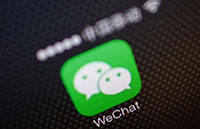Parents bemoan ease of in-app payments
By Du Juan In Xi'an And Shi Xiaofeng In Hangzhou (China Daily) Updated: 2016-05-04 08:02
A couple from Wenzhou, Zhejiang province, have found a novel way to educate their son about the dangers of in-app payments.
Xiao Hao, 12, became obsessed with a mobile game in April and played it on his mother's mobile phone on an almost daily basis for several weeks.
His parents didn't pay much attention until one day his mother found unexplained charges on her credit card bill amounting to 9,000 yuan ($1,390).
The money had been spent on virtual equipment for the mobile game through Alipay, a payment platform owned by Alibaba Group.
Xiao's father, surnamed Yang, who declined to provide his full name, said he saw this as an opportunity to educate his son rather than punish him.
"I asked him to issue an IOU, according to which he will pay back the money he owes his mother by doing housework and achieving high scores in tests," Yang told China Daily.
This arrangement sees Xiao pay back the debt by "earning" 10 yuan every time he washes the dishes, 20 yuan every time he cleans the floors and 100 yuan for getting a higher-than-95 score in a math test.
"My wife and I were angry about our son spending so much money that he could not afford on a mobile game without telling us. However, the excessively easy payment procedure provided by the game company and payment provider are also responsible for what happened," Yang said.
"The game draws him in by giving him a sense of achievement each time he reaches a new level. I have guided him to gain this feeling by doing housework and studying to pay off the IOU."
Yang, who estimates it will take his son two years to pay back the 9,000 yuan, said it was too easy for children to get hold of phones and rack up huge debts on similar games.
He said the authorities should enforce stricter requirements on game companies to improve the entire payment system.
Sun Kaite, a lawyer from Zhejiang Pinhe Law Firm, said minors should get consent from their guardians when they make purchases involving large amounts of money.
If the parents can provide evidence that the son made the payments without their knowledge, the company should return part of the money - but the parents are still partially responsible, Sun said.
- No letup in anti-graft fight, Xi warns Party ‘cabals and cliques’
- Families demand refunds for cancer treatment
- Emirates launches flights between Yinchuan and Dubai
- HK needs to rehabilitate its tourist-friendly image: Experts
- Fossil footprints bring dinosaurs to life
- More than 15 pct of China's population are over 60
- Baidu's share price drops after probe into search engine launched
- Baidu faces probe after outcry over cancer treatment
- PLA enlists rap-style music video to recruit young people
- Hukou problem surfaces after an 11-year-old lie comes to light








